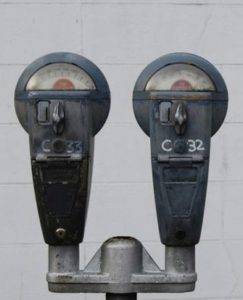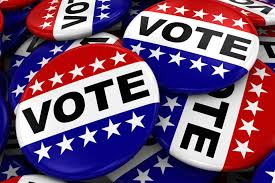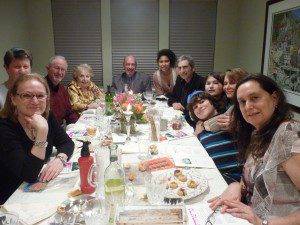We Rise- an inspiring song by Batya Levine sung by my friends at the Interfaith Music Project of Philadelphia.
Shabbat Shalom!
https://www.youtube.com/watch?v=5qZsh4mVkfY
We Rise- an inspiring song by Batya Levine sung by my friends at the Interfaith Music Project of Philadelphia.
Shabbat Shalom!
https://www.youtube.com/watch?v=5qZsh4mVkfY
An interesting way to welcome Shabbat from 8th Day, an American Chasidic pop-rock band from California.
Enjoy and Shabbat Shalom!
 As we begin the last book of the Torah, Moses confronts this question in Parshat Devarim.
As we begin the last book of the Torah, Moses confronts this question in Parshat Devarim.
Even the title begs the question. Devarim, what are the words and things? What is the story we will tell to those we hope will carry it in their hearts after we are gone?
For most of us, this requires us to project forward in order to look back. But it cannot be make-believe; our legacy will be based on the life we live. The things we do will be the basis for the memories our loved ones will recall. How we touch their lives will define whether they can celebrate having had us in their lives. Our legacy will not have the great accomplishments of Moses, of course as our tradition tells us, there has never been another like Moses. Our legacy will be the impact and influence we have had on our loved ones. But will we be the best version of ourselves?
The story is told of Reb Zusya, the Chasidic Master, who struggled at the end of his life. He awoke panicked from a dream about the prospect of entering Heaven. His students tried to support their beloved teacher claiming he was indeed great like Moses and Abraham. Zusya replied that he knew that God would not compare him to Moses and Abraham but instead, God would ask why Zusya wasn’t more like Zusya?
If we do not live up to all that we can be, we do not realize our full potential. And importantly, we let ourselves and our loved ones down. Only we can write our story by living our lives as best and as fully as we can. Then we will truly leave a worthy inheritance, a life of merit and honor, of love and accomplishment that will touch the hearts of those we care about.
 I saw the meter maid stepping towards the back of my car to get license plate info. The meter had expired a few minutes before and like clockwork, she was there at the ready to write the ticket. I called out “Excuse me Ma’am!” and started to cross the street hopefully catching her in time. As I stepped off the curb, I felt a snap in my knee and down I went. The pain was excruciating. She looked up and saw me. I knew I had to get to her so I limped over as best I could, needing to catch my breath before I could say anything. She reached out to me to help me and asked if I was okay. We started to talk and she made it clear that she would not leave me until I was safely in my car.
I saw the meter maid stepping towards the back of my car to get license plate info. The meter had expired a few minutes before and like clockwork, she was there at the ready to write the ticket. I called out “Excuse me Ma’am!” and started to cross the street hopefully catching her in time. As I stepped off the curb, I felt a snap in my knee and down I went. The pain was excruciating. She looked up and saw me. I knew I had to get to her so I limped over as best I could, needing to catch my breath before I could say anything. She reached out to me to help me and asked if I was okay. We started to talk and she made it clear that she would not leave me until I was safely in my car.
She went from “meter maid” or “traffic enforcement officer” to caring human being. Actually, she was a lovely caring human being all along. It took me a while to realize that.
I do not know who she is. I never got her name. I reached out to the Parking Authority to try to find her and say thank you. They likely do not get too many of those kinds of letters.
And as I was sitting in my car, gaining my composure, I could not help but notice the person a couple of cars behind me frantically waving a ticket in his hand as he ran towards a confrontation with my good Samaritan.
So thank you my nameless good Samaritan. Thank you for sharing your humanity when I needed it.
 In response to the horrible acts perpetrated by the American government, people are planning marches and demonstrations against United States Immigration Policy and the Trump Administration implementing said policy. But there is a very important point to remember: Trump was elected President. The members of Congress who actively support his policies, including this one, were also elected. Only through our electoral system can we affect change. Marches might feel good, but they are ineffective against those who hold and exercise raw unbridled power, using a politics of division to keep their minority base firmly in control. To prevail in the fight we must wage, we must use politics to change those governing and the policies they pursue.
In response to the horrible acts perpetrated by the American government, people are planning marches and demonstrations against United States Immigration Policy and the Trump Administration implementing said policy. But there is a very important point to remember: Trump was elected President. The members of Congress who actively support his policies, including this one, were also elected. Only through our electoral system can we affect change. Marches might feel good, but they are ineffective against those who hold and exercise raw unbridled power, using a politics of division to keep their minority base firmly in control. To prevail in the fight we must wage, we must use politics to change those governing and the policies they pursue.
The wholesale assault on heretofore fundamental American principles of decency and values combined with the message of divisiveness rather than unity are the primary domestic issues giving license to the basest instincts of self-protection and self-promotion. These are narrow and short-sighted attempts to impose the will of the stronger upon the weaker. We must convince the American voting public that there is a better way. And only through galvanizing the vote can our ideas triumph.
If we are to do anything of enduring value we should register people to vote and then make sure they do so. People like James Chaney, Andrew Goodman, and Michael Schwerner, and John Lewis should be the great iconic figures that inspire us to action because never has there been so much at stake.
March and demonstrate, but do not be surprised if the sun rises tomorrow in the East and the Trump Administration continues its policies unabated and unaffected. For that alone will not create change. Actively engage in the political process and perhaps our system of government will again offer a constructive message of hope.
 The appalling misuse of the Bible to defend stripping children from their parents at the border adds insult to injury, something I would have thought all but impossible given the heinous underlying act. It makes the indefensible downright obscene.
The appalling misuse of the Bible to defend stripping children from their parents at the border adds insult to injury, something I would have thought all but impossible given the heinous underlying act. It makes the indefensible downright obscene.
Whatever our personal position on strong border controls may be, this inhumane action undermines our most fundamental values. We are a nation of laws, but very importantly we are also a nation of hope. Our laws can be applied humanely with mercy and compassion. This egregious violation of our values is a symptom of a growing cancer in our society.
In an age of increasing division and antipathy, this moment needs to serve as a tipping point. Can we aspire to be the light unto the other nations, leading by example or must we retreat building walls that separate us in the name of protecting us? History shows us time and again that the latter approach ultimately fails. And by the time the walls are ultimately breached, what found inside is a hollow shell of the greatness that once lived.
Our greatness comes not from the domination of a ruler, or even the majority. Our greatness springs from America’s ability to protect and defend the minority when the majority prevails, exercising its will civilly and compassionately.
To those who find the actions on our borders justifiable, shame on you for your heartlessness. To those who find these actions unjustifiable, our thoughts must be backed by action that will cause change. Otherwise, we too will be responsible for the horrors wrought upon the children.
This Shabbat I wanted to share Give Me Your Tired, Your Poor, Irving Berlin’s musical rendition of Emma Lazarus’ poem at the base of the Statue of Liberty, sung by the Texas Children’s Choir.
As you listen to this song, children are being detained and forcibly separated from parents at our border. Regardless of your stand on illegal immigration, this inhumane and cruel act is nothing more than a blight on the greatness that is supposed to be our nation. Demand Congress act immediately to spare children from this.
Shabbat Shalom
 In my early training as a lifeguard, I was taught that you can only do so much to save another. You swim out to the distressed and offer a life ring, once they grab on to it, you can swim into shore rescuing him/her. But they had to grab hold of the flotation device otherwise you would risk both of your lives. You could go most of the way, but you needed the participation of the other. Later on, I learned a more aggressive approach to lifesaving using grips and evasive maneuvers to assert control over the victim. Finally, I learned that sometimes to save a life required knocking the other person out with a swift cross to the jaw. You saved two lives in that precarious moment, yours and the victim’s.
In my early training as a lifeguard, I was taught that you can only do so much to save another. You swim out to the distressed and offer a life ring, once they grab on to it, you can swim into shore rescuing him/her. But they had to grab hold of the flotation device otherwise you would risk both of your lives. You could go most of the way, but you needed the participation of the other. Later on, I learned a more aggressive approach to lifesaving using grips and evasive maneuvers to assert control over the victim. Finally, I learned that sometimes to save a life required knocking the other person out with a swift cross to the jaw. You saved two lives in that precarious moment, yours and the victim’s.
How actively and strongly do we intercede when it comes to saving another? How do we determine the appropriate course of action? Sadly, it often devolves into a matter of personal convenience. Whether it is suicide, drug abuse, or so many of our civic/social problems, we often find it easier to ignore them. How often do we step over the person sitting in the street begging rather than at least engage their humanity?
People need to be seen and heard. The silent scream of despair of one soul should ring as loudly in our ears as the giant thunderclap from the heavens. Wringing hands and feeling another’ pain consoles our own ego, but it does nothing to help another in need. If there is something we all need more of, it is human connection. Every one of us is nurtured by interactions with others. It makes us feel cared for, it makes us feel human. The loss of this most basic need dehumanizes us and only bad things can ensue.
We have reached a tipping point. It is time for each of us to reenergize human connection. Social media is a place to share, but it is does not replace the interpersonal one-on-one experiences with another. Government programs can provide safety nets but cannot create the human warmth and validation each of us so desperately needs. Communities of caring such as synagogues and churches can bring us together in important ways. But it all begins with me and my ability to see you, as an individual in your humanity; every one of us realizing that we need each other to truly be complete. And in that critical precarious moment, I am the person who can rescue you and you are the person who has the power to rescue me.
A beautiful message from The Interfaith Music Project of Philadelphia
Shabbat Shalom
https://www.youtube.com/watch?v=5qZsh4mVkfY
 As we share Passover at the Seder table this year, notice that it is in the process of change. We are instructed to remember the Exodus experience and to consider as though we experience it ourselves as we participate in the reenactment. But this tradition evolves; with each generation, we fashion the Seder into something that is uniquely ours.
As we share Passover at the Seder table this year, notice that it is in the process of change. We are instructed to remember the Exodus experience and to consider as though we experience it ourselves as we participate in the reenactment. But this tradition evolves; with each generation, we fashion the Seder into something that is uniquely ours.
I recall the Seders of two generations ago, the seemingly endless table that ran from room to room of the small apartment in the Bronx or the small home in Queens. These are wonderful memories from long ago and much of those traditions continue on. But our current Seder will be different from those of my past. For example, an Orange and Olives will find themselves on our current Seder Plate and Miriam’s cup will be prominently placed alongside Elijah’s. Instead of asking the four questions, I will lead (to the extent my boisterous family will permit). We will read from a Hagaddah fashioned by my niece with interpretations and questions that resonate with her generation. For they are the future.
The Seder will continue to progress as the next generation of our family steps into the role of leadership and we slowly cede our positions leadership and authority, hopefully becoming Elders with positions of respect and wisdom. This is the natural progression of things. For each of us must embrace our understanding of the Jewish experience not only as a communal experience but as something uniquely our own. This was the tradition will be a meaningful part of our identity combining ritual with relevance.
At the Seder table, we can each look to either side (figuratively or literally), seeing our parents and what they have bequeathed to us and seeing our children as they fashion and shape Judaism as their own. This is the blessing of our legacy; family and historic community forming an unbroken chain linking us all together.
Wishing everyone a Joyful Pesach. Chag Pesach Sameach! and Shabbat Shalom